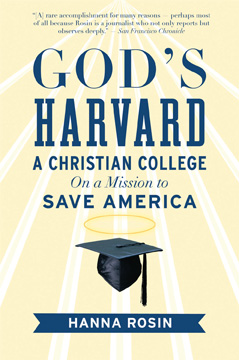 I recently read God’s Harvard, by Washington Post reporter Hanna Rosin. It’s a profile of the people and philosophy behind Patrick Henry College, a private Christian college located not too far from me, in Purcellville, Virginia. PHC is an Evangelical place that strives to serve its homeschooled matriculating freshmen with a sense of worldliness and mastery of the liberal arts, so that by the time they graduate, they are equipped to influence the country. They want to aggressively move the U.S. toward more conservative and Christian principles. When George W. Bush was President, an extraordinary number of White House interns (~7%) came from this one small school, a proportion akin to Georgetown University or other traditional centers of the academic elite. Let’s clarify what we mean by small: 300-350 students, and a couple dozen full-time faculty.
I recently read God’s Harvard, by Washington Post reporter Hanna Rosin. It’s a profile of the people and philosophy behind Patrick Henry College, a private Christian college located not too far from me, in Purcellville, Virginia. PHC is an Evangelical place that strives to serve its homeschooled matriculating freshmen with a sense of worldliness and mastery of the liberal arts, so that by the time they graduate, they are equipped to influence the country. They want to aggressively move the U.S. toward more conservative and Christian principles. When George W. Bush was President, an extraordinary number of White House interns (~7%) came from this one small school, a proportion akin to Georgetown University or other traditional centers of the academic elite. Let’s clarify what we mean by small: 300-350 students, and a couple dozen full-time faculty.
So there’s something distinctive about this place – in spite of its diminutive size, it has (or at least, had) a disproportionate involvement in the power structure of the United States of America. It’s not “just another Bible college.” That special something was what drew author Rosin in, and it appears that she was given extraordinary access to the place, profiling its students in detail, select members of its faculty, and most particularly, its chancellor, Michael Farris. Farris founded and ran the Home School Legal Defense Association prior to his venture into higher education, and he also once ran (when I was in college) for lieutenant governor of the Commonwealth of Virginia. Portrayed by Rosin, Farris comes off as driven so acutely to advance his mission that he undermines his own efforts, like a cannon so powerful that it knocks itself askew once it starts firing. (Military analogies abound in discussions of PHC, as most of its adherents see themselves fighting a mighty cultural war.)
The book charts the school from its founding through to a major kerfuffle when the least zealous faculty were fired or quit due to internecine conflict with Farris. He wanted them to be more explicitly Christian at each possible moment, and the faculty wanted to teach as they saw fit. It was a classic case of academic freedom. Some of the students were inspired by some of these faculty, and even staged a “Dead Poets Society” sort of protest when it all fell apart in 2006. The school survived. PHC continues to accept and graduate students, and presumably the remaining faculty toe the line better than their ex-colleagues managed.
PHC was in the news last month, incidentally, when a piece by Kiera Feldman in the New Republic documented a pattern of suppressing reporting of incidents of sexual assault at the college. I didn’t read the book because of that article, but having them both cross my radar in the same month deepens my sense of attention towards this interesting place. I’m interested in PHC because it’s higher education, it’s in my own state (like Liberty University), and it’s a distinctive manifestation of the ongoing cultural conflict between U.S. subpopulations. PHC is a creationist institution, to be clear. Everyone who teaches or learns there must subscribe to a statement of faith. Coming from a background of unfettered intellectualism, wherein conclusions are results rather than preconditions, I find it hard to imagine such a thing – but I guess that’s where books like Rosin’s come in, shedding some light on what would otherwise be mysterious.
Anyhow, I’m glad to know more about this singular place as a result of reading this book.
